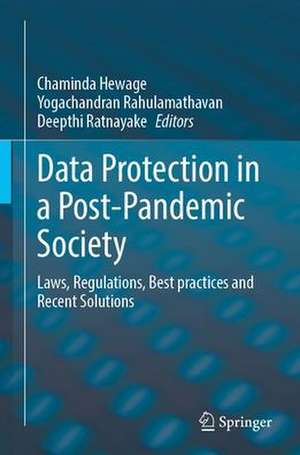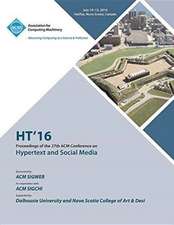Data Protection in a Post-Pandemic Society: Laws, Regulations, Best Practices and Recent Solutions
Editat de Chaminda Hewage, Yogachandran Rahulamathavan, Deepthi Ratnayakeen Limba Engleză Hardback – 12 iul 2023
Data protection is a key aspect of information security where personal and business data need to be protected from unauthorized access and modification. The stolen personal information has been used for many purposes such as ransom, bullying and identity theft. Due to the wider usage of the Internet and social media applications, people make themselves vulnerable by sharing personal data. This book discusses the challenges associated with personal data protection prior, during and post COVID-19 pandemic. Some of these challenges are caused by the technological advancements (e.g. Artificial Intelligence (AI)/Machine Learning (ML) and ChatGPT).
In order to preserve the privacy of the data involved, there are novel techniques such as zero knowledge proof, fully homomorphic encryption, multi-party computations are being deployed. The tension between data privacy and data utility drive innovation in this area where numerous start-ups around the world have started receiving funding from government agencies and venture capitalists. This fuels the adoption of privacy-preserving data computation techniques in real application and the field is rapidly evolving. Researchers and students studying/working in data protection and related security fields will find this book useful as a reference.
| Toate formatele și edițiile | Preț | Express |
|---|---|---|
| Paperback (1) | 982.19 lei 38-44 zile | |
| Springer International Publishing – 13 iul 2024 | 982.19 lei 38-44 zile | |
| Hardback (1) | 1162.70 lei 43-57 zile | |
| Springer International Publishing – 12 iul 2023 | 1162.70 lei 43-57 zile |
Preț: 1162.70 lei
Preț vechi: 1453.37 lei
-20% Nou
Puncte Express: 1744
Preț estimativ în valută:
222.48€ • 232.91$ • 184.09£
222.48€ • 232.91$ • 184.09£
Carte tipărită la comandă
Livrare economică 07-21 aprilie
Preluare comenzi: 021 569.72.76
Specificații
ISBN-13: 9783031340055
ISBN-10: 3031340051
Pagini: 239
Ilustrații: XIV, 239 p. 47 illus., 41 illus. in color.
Dimensiuni: 155 x 235 mm
Greutate: 0.55 kg
Ediția:2023
Editura: Springer International Publishing
Colecția Springer
Locul publicării:Cham, Switzerland
ISBN-10: 3031340051
Pagini: 239
Ilustrații: XIV, 239 p. 47 illus., 41 illus. in color.
Dimensiuni: 155 x 235 mm
Greutate: 0.55 kg
Ediția:2023
Editura: Springer International Publishing
Colecția Springer
Locul publicării:Cham, Switzerland
Cuprins
Chapter. 1. Post-Covid-19 Metaverse Cybersecurity and Data Privacy-Present and Future Challenges.- Chapter. 2. Keeping it Low-Key: Modern-day approaches to Privacy-Preserving Machine Learning.- Chapter. 3. Security Analysis of Android Hot Cryptocurrency Wallet Applications.- Chapter. 4. Exploring the Opportunities of Applying Digital Twins for Intrusion Detection in Industrial Control Systems of Production and Manufacturing – A Systematic Review.- Chapter. 5. Securing Privacy During a World Health Emergency: Exploring How to Create a Balance Between the Need to Save the World and People’s Right to Privacy.- Chapter. 6. Federated Learning: Data privacy and cyber security in edge-based machine learning Mobile Malware Detection Using Consortium.- Chapter. 7. Emerging Computer Security Laws and Regulations across the Globe: A Comparison between Sri Lankan and Contemporary International Computer Acts.- Chapter. 8. Legal Considerations and Ethical Challenges of Artificial Intelligence on Internet of Things and Smart Cities.
Notă biografică
Chaminda Hewage is a Reader (Associate Professor) of Data Security in the Cardiff School of Technologies at Cardiff Metropolitan University, UK where he is also the Associate Dean Research for the school. He is the founder and director of Cybersecurity and Information Networks Centre (CINC). He received a B.Sc. Engineering (First Class Honours Degree) in Electrical and Information Engineering from the Faculty of Engineering, University of Ruhuna (Sri Lanka) in 2004 and a Ph.D. in Multimedia Communications from the University of Surrey (UK) in 2009. He was awarded the Gold Medal for best performance in Engineering (2014) by the University of Ruhuna for his achievements in undergraduate studies at the General Convocation held in 2004. After graduation, he joined Sri Lanka Telecom PLC (Sri Lanka) as a Telcommunication Engineer (2004). In September 2005, he was awarded the Overseas Research Scholarships (ORS) scholarship by the Higher Education Funding Council of England(Universities UK) to pursue his Ph.D. at the University of Surrey, UK. Upon completion of his PhD, he works as a researcher at the University of Surrey, UK and Kingston University, London, UK. In 2015, he joined Cardiff Metropolitan University, UK as a Senior Lecturer. In 2014, he received a Post-Graduate Certification in Higher Education (HE) Teaching and Learning from Kingston University – London. He is a Fellow of the Higher Education Academy (HEA), UK. He is a Senior member of the IEEE and Member of the Chartered Institute of Information Security (CIISec).
Yogachandran Rahulamathavan is a Senior Lecturer and the Programme Director for MSc Cyber Security and Data Analytics at Loughborough University’s London Campus in the UK. Yoga obtained his PhD degree from Loughborough University in mathematical optimisation techniques for information processing in 2012. His research interest is in developing novel security protocols to advance machine learning techniques to solve complex privacy issues. Currently focussing on postquantum encryption techniques to develop privacy-preserving machine learning algorithms. Currently, Dr Rahul coordinates a UK-India project between Loughborough University London, IIT Kharagpur, India and City, University of London. He is a Senior Member of IEEE and an Associate Editor for the IEEE Access journal.
Dr. Deepthi Ratnayake is a university academic, a researcher, and an author with nearly 30 years' experience in industry, defence and academia in the areas of cyber security, networking, and information systems management. She currently serves as a Senior Lecturer in Computer Science (Cyber Security and Networks) and is a member of Cyber Security Research Group within the School of Physics, Engineering and Computer Science (PECS) at the University of Hertfordshire, UK. Deepthi is also an executive officer of Information Security Specialist Group of BritishComputer Society (BCS-ISSG), an associate editor of Information Security Journal: A Global Perspective, and a Cyber Security Columnist at BCS ITNow quarterly magazine. Deepthi obtained her PhD in Probe Request Attack Detection in Wireless LANs using Intelligent Techniques. Her research interests are intruder detection and prevention using intelligent techniques, ISM automation and security in humanoids. She has delivered several academic and professional talks, has published in refereed national/international conferences and has authored journal articles of high impact. She also regularly contributes to policy advisory and reaches wider audiences through her articles on current hot topics. She is also keen on bridging the gap between business needs and cyber security education and cyber-crime prevention. She has organised many collaborative events that included participation of university academics & students, professional bodies, industry and government agencies.
Textul de pe ultima copertă
This book offers the latest research results and predictions in data protection with a special focus on post-pandemic society. This book also includes various case studies and applications on data protection. It includes the Internet of Things (IoT), smart cities, federated learning, Metaverse, cryptography and cybersecurity. Data protection has burst onto the computer security scene due to the increased interest in securing personal data.
Data protection is a key aspect of information security where personal and business data need to be protected from unauthorized access and modification. The stolen personal information has been used for many purposes such as ransom, bullying and identity theft. Due to the wider usage of the Internet and social media applications, people make themselves vulnerable by sharing personal data. This book discusses the challenges associated with personal data protection prior, during and post COVID-19 pandemic. Some of these challenges are caused by the technological advancements (e.g., Artificial Intelligence (AI)/Machine Learning (ML) and ChatGPT).
In order to preserve the privacy of the data involved, there are novel techniques such as zero knowledge proof, fully homomorphic encryption, multi-party computations are being deployed. The tension between data privacy and data utility drive innovation in this area where numerous start-ups around the world have started receiving funding from government agencies and venture capitalists. This fuels the adoption of privacy-preserving data computation techniques in real application and the field is rapidly evolving. Researchers and students studying/working in data protection and related security fields will find this book useful as a reference.
Data protection is a key aspect of information security where personal and business data need to be protected from unauthorized access and modification. The stolen personal information has been used for many purposes such as ransom, bullying and identity theft. Due to the wider usage of the Internet and social media applications, people make themselves vulnerable by sharing personal data. This book discusses the challenges associated with personal data protection prior, during and post COVID-19 pandemic. Some of these challenges are caused by the technological advancements (e.g., Artificial Intelligence (AI)/Machine Learning (ML) and ChatGPT).
In order to preserve the privacy of the data involved, there are novel techniques such as zero knowledge proof, fully homomorphic encryption, multi-party computations are being deployed. The tension between data privacy and data utility drive innovation in this area where numerous start-ups around the world have started receiving funding from government agencies and venture capitalists. This fuels the adoption of privacy-preserving data computation techniques in real application and the field is rapidly evolving. Researchers and students studying/working in data protection and related security fields will find this book useful as a reference.
Caracteristici
Offers the latest research results in data protection Provide a comprehensive survey of the literature on current and emerging challenges Recommends important and specific future research directions















